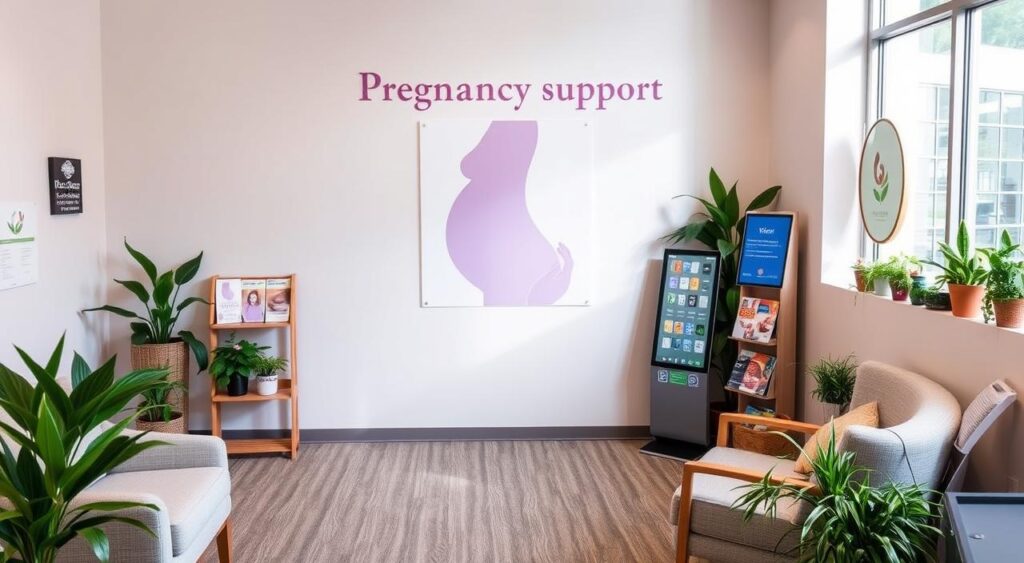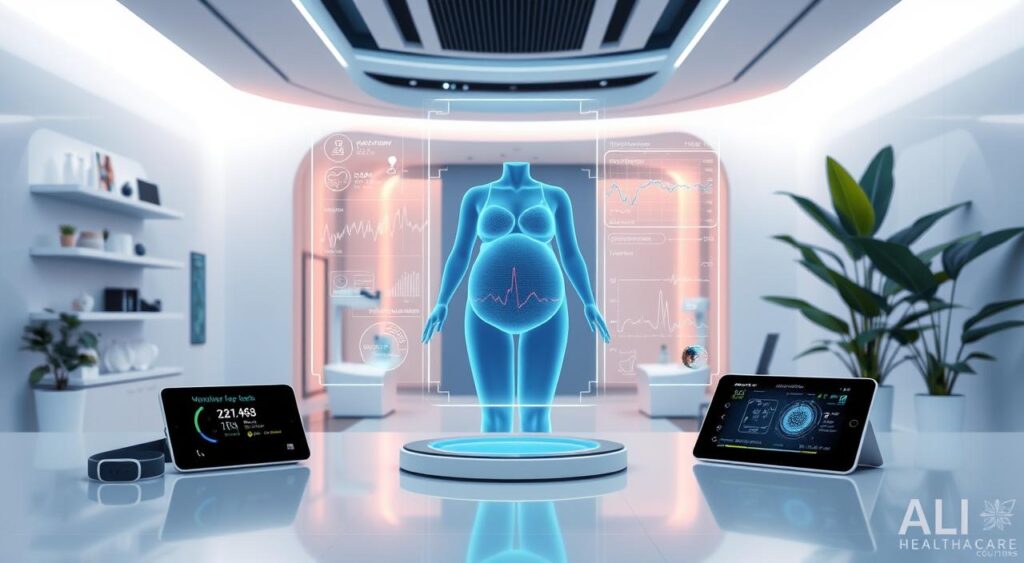The Project 2025 Pregnancy Registry is a groundbreaking initiative. It aims to empower expectant mothers and healthcare providers. By using data-driven insights, it seeks to enhance prenatal care and improve birth outcomes. This article delves into the registry’s details, its goals, and the advantages it brings to those involved.

Key Takeaways
- The Project 2025 Pregnancy Registry is a data-driven initiative to enhance maternal and child health outcomes.
- The registry aims to collect and analyze comprehensive pregnancy and birth data to identify areas for improved prenatal care.
- Leveraging healthcare technology and digital health solutions, the registry facilitates real-time tracking of pregnancy and birth trends.
- Expectant mothers can access personalized support and resources through the registry, empowering them to make informed decisions.
- The project’s data privacy and security measures ensure the protection of participants’ sensitive information.
What is the Project 2025 Pregnancy Registry?
The Project 2025 Pregnancy Registry is a nationwide initiative focused on collecting and analyzing data from pregnant women. It aims to identify trends, risk factors, and best practices in prenatal care and pregnancy outcomes. This registry is crucial for supporting maternal health and improving birth outcomes. It provides healthcare providers with valuable insights.
Understanding the Registry’s Purpose
The core purpose of the Project 2025 Pregnancy Registry is to enhance prenatal care and reduce pregnancy-related complications. It empowers expectant mothers through data-driven decision-making. By gathering comprehensive information on maternal health, prenatal care, and birth outcomes, the registry helps healthcare professionals understand the factors influencing pregnancy and childbirth.
Key Objectives and Goals
The primary objectives of the Project 2025 Pregnancy Registry include:
- Improving prenatal care and reducing maternal and infant mortality rates
- Identifying risk factors and developing targeted interventions to address them
- Empowering expectant mothers with data-driven insights to make informed decisions about their pregnancy
- Providing healthcare providers with valuable information to enhance their patient care
- Advancing research and understanding of maternal health and pregnancy-related conditions
By achieving these goals, the Project 2025 Pregnancy Registry aims to make a significant impact on maternal health and birth outcomes. It seeks to contribute to the overall well-being of families and communities across the United States.

Maternal Health and Prenatal Care
Maternal health and prenatal care are vital for healthy pregnancies and positive birth outcomes. The Project 2025 Pregnancy Registry supports these critical healthcare aspects. It collects detailed data from participants. This data helps healthcare providers improve prenatal care practices.
Proper maternal health and prenatal care are crucial for the mother’s and the baby’s well-being. Regular check-ups and screenings during pregnancy can identify and address potential issues. This ensures the best possible birth outcomes.
The Project 2025 Pregnancy Registry aims to gather valuable data. This data will guide healthcare providers in delivering more effective prenatal care. Understanding the factors that contribute to positive pregnancy and birth experiences is key. The registry will inform best practices and help improve maternal and child health outcomes.
| Key Aspects of Maternal Health and Prenatal Care | Importance |
|---|---|
| Regular Prenatal Visits | Allows healthcare providers to monitor the mother and baby’s health, identify and address any issues early on. |
| Prenatal Screenings and Tests | Help detect potential complications or risk factors, enabling proactive management and care. |
| Nutritional Counseling and Support | Ensures the mother receives the necessary nutrients and guidance for a healthy pregnancy. |
| Emotional and Psychological Support | Helps expectant mothers navigate the physical and emotional changes of pregnancy. |

By focusing on maternal health and prenatal care, the Project 2025 Pregnancy Registry aims to empower expectant mothers, healthcare providers, and policymakers. Together, they strive for the best possible birth outcomes for families nationwide.
Tracking Pregnancy and Birth Outcomes
The Project 2025 Pregnancy Registry focuses on tracking pregnancy and birth outcomes with precision. It collects data to gain insights that improve prenatal care. This effort aims to support better birth outcomes for expectant mothers.
Data Collection and Analysis
The registry’s core is the detailed collection and analysis of data on pregnancy tracking and birth outcomes. Healthcare providers contribute by gathering information on gestational health, fetal development, and postpartum recovery. Advanced analytical techniques are applied to this data to uncover patterns and trends.
Through data collection and data analysis, the registry is set to offer healthcare professionals crucial insights. These insights can lead to enhanced prenatal care and improved birth outcomes for both mothers and infants.
| Key Data Points Collected | Analytical Techniques Employed |
|---|---|
| Maternal health status Fetal growth and development Pregnancy complications Delivery methods and outcomes Postpartum recovery | Trend analysis Risk factor identification Correlation studies Predictive modeling Comparative data assessment |
The Project 2025 Pregnancy Registry tracks pregnancy tracking and birth outcomes with meticulous care. Through data collection and data analysis, it aims to empower healthcare providers. This empowerment will lead to better prenatal care and improved health outcomes for mothers and infants.

The Role of Healthcare Technology
The Project 2025 Pregnancy Registry is leading the charge in using advanced healthcare technology and digital health solutions. It aims to improve pregnancy tracking and maternal care. By leveraging technology, the registry seeks to empower expectant mothers and make data collection more efficient.
Digital Health Solutions in Pregnancy
At the core of the registry’s strategy are mobile apps and wearable devices. These tools enable pregnant women to track and share their pregnancy tracking data easily. This digital approach facilitates the collection of real-time data. It helps researchers and healthcare providers understand maternal health and birth outcomes better.
- Secure data-sharing platforms: The registry employs secure platforms for data sharing. This ensures the privacy and confidentiality of participant information, building trust and encouraging participation.
- Integrated monitoring: Wearable devices and mobile apps allow expectant mothers to monitor health indicators like physical activity, sleep, and vital signs. This provides valuable insights into their health.
- Personalized support: Through these digital tools, participants can access customized guidance, educational resources, and support networks. This empowers them throughout their pregnancy journey.
The Project 2025 Pregnancy Registry is committed to transforming pregnancy data collection, analysis, and use. It aims to drive significant improvements in maternal and child health through healthcare technology and digital health solutions.

Project 2025 Pregnancy Registry
The Project 2025 Pregnancy Registry is a groundbreaking effort. It unites expectant mothers, healthcare professionals, and researchers. Together, they aim to enhance maternal health and improve birth outcomes. This registry collects and analyzes detailed data from participants. It seeks to uncover insights that can lead to better prenatal care and empower women to make informed health choices during pregnancy.
The core of the Project 2025 Pregnancy Registry is its dedication to bettering maternal health, prenatal care, and pregnancy tracking. It fosters a collaborative environment. Here, data from participants is used to spot trends, identify challenges, and develop solutions. These efforts aim to positively influence birth outcomes.
The main goals of the Project 2025 Pregnancy Registry are:
- Collecting comprehensive data on the experiences and health trajectories of pregnant women
- Analyzing the gathered information to identify areas for improvement in prenatal care and maternal health support
- Developing evidence-based strategies and interventions to enhance the overall well-being of expectant mothers and their babies
- Fostering collaboration between healthcare providers, researchers, and participants to drive meaningful change
By joining the Project 2025 Pregnancy Registry, expectant mothers contribute to groundbreaking research. They help shape the future of maternal healthcare. This initiative is a powerful tool for empowering women, advancing medical knowledge, and improving the health and well-being of both mothers and their newborns.

Benefits for Expectant Mothers
Joining the Project 2025 Pregnancy Registry brings numerous advantages for expectant mothers. They gain access to a vast collection of resources and support, all tailored to their unique pregnancy experiences.
Support and Resources
The registry offers a wide range of support services and educational materials. Participants can connect with healthcare professionals, join support groups, and explore a wealth of information on maternal health and prenatal care.
- Personalized guidance and counseling from maternal health experts
- Connections to local and national support groups for expectant mothers
- Access to educational resources on topics such as nutrition, exercise, and mental health during pregnancy
- Insights into trends and advancements in prenatal care and maternal health
The Project 2025 Pregnancy Registry empowers expectant mothers with data-driven knowledge and a supportive network. It aims to transform our approach to maternal health and prenatal care.
| Resource | Description |
|---|---|
| Personalized Guidance | Expectant mothers receive tailored support and advice from maternal health experts based on their individual needs and the data collected in the registry. |
| Support Networks | Participants can connect with other expectant mothers, share experiences, and find community through the registry’s online and in-person support groups. |
| Educational Materials | The registry offers a vast library of educational resources on topics such as nutrition, exercise, mental health, and the latest advancements in prenatal care. |
The Project 2025 Pregnancy Registry is revolutionizing how expectant mothers access support and resources. It uses data and technology to enhance their prenatal care journey, making it more confident and manageable.
Data Privacy and Security Measures
Protecting participant data privacy and security is paramount for the Project 2025 Pregnancy Registry. It has put in place strong measures to keep the information of expectant mothers confidential. This is a top priority.
The registry’s data privacy and security strategy centers on comprehensive encryption protocols. All participant data is encrypted, ensuring sensitive information is safe from unauthorized access. Strict access controls are also in place, allowing only authorized personnel to view and process the data.
The Project 2025 Pregnancy Registry also complies with all relevant data privacy regulations, like the Health Insurance Portability and Accountability Act (HIPAA) in the United States. This shows the registry’s commitment to participant protection and responsible data stewardship.
| Data Privacy and Security Measures | Description |
|---|---|
| Encryption | All participant data is securely encrypted to prevent unauthorized access. |
| Access Controls | Strict access controls are in place, limiting data access to authorized personnel only. |
| Regulatory Compliance | The registry adheres to all applicable data privacy regulations, such as HIPAA. |
Through these comprehensive data security measures, the Project 2025 Pregnancy Registry ensures participant information privacy and confidentiality. This is crucial for building trust and encouraging expectant mothers to participate. It’s essential for the registry’s success.
Partnering with Healthcare Providers
The Project 2025 Pregnancy Registry acknowledges the vital role healthcare providers play in enhancing maternal health and birth outcomes. It works closely with obstetricians, gynecologists, and other prenatal care specialists. The goal is to ensure the data collected and insights generated are directly applicable to improving clinical practice.
Collaboration for Better Care
This partnership between the registry and healthcare providers aims to integrate data-driven insights into prenatal care seamlessly. It leverages the expertise and real-world experience of healthcare providers. This helps identify areas for improvement and develop tailored solutions for expectant mothers.
By working hand-in-hand with healthcare providers, the Project 2025 Pregnancy Registry can:
- Enhance prenatal care protocols based on the latest research and data
- Identify and address gaps in care collaboration between different healthcare specialists
- Develop innovative digital health solutions that integrate seamlessly into clinical workflows
- Continuously monitor and improve birth outcomes for expectant mothers
This collaborative approach ensures the insights generated by the registry are not only informative but also actionable. They directly contribute to better health outcomes for both mothers and their babies.
Improving Population Health
The Project 2025 Pregnancy Registry extends beyond individual expectant mothers, aiming to boost population health overall. It gathers and analyzes data on a large scale. This helps identify trends, risk factors, and best practices. These insights inform healthcare policies, resource allocation, and public health initiatives to enhance maternal health outcomes across communities.
One of the registry’s main goals is to explore the factors influencing birth outcomes and maternal health on a population level. This data aids healthcare providers, policymakers, and public health organizations. They can develop targeted interventions and allocate resources more effectively. This ensures they meet the unique needs of different communities.
The registry may reveal disparities in maternal health outcomes based on race, socioeconomic status, or geographic location. By spotting these trends, stakeholders can tackle the root causes. They can implement strategies to ensure equitable access to quality prenatal care and support services.
| Metric | National Average | Project 2025 Registry Data |
|---|---|---|
| Preterm Birth Rate | 10.2% | 8.9% |
| Low Birth Weight Rate | 8.3% | 7.1% |
| Maternal Mortality Ratio | 17.4 per 100,000 live births | 15.2 per 100,000 live births |
By tapping into the insights from the Project 2025 Pregnancy Registry, healthcare providers, policymakers, and public health organizations can make more informed decisions. They can improve population health outcomes, especially in maternal health and birth outcomes.
Challenges and Considerations
The Project 2025 Pregnancy Registry aims to transform maternal health and birth outcomes. However, it faces several challenges and considerations. These must be addressed to ensure its long-term success.
Addressing Potential Barriers
Ensuring equitable access to the registry’s resources and services is a primary concern. Barriers to maternal health, prenatal care, and birth outcomes vary across different socioeconomic and demographic groups. The registry must identify and mitigate these barriers. It must make its offerings accessible to all expectant mothers, regardless of their background or location.
Another challenge is addressing ethical and logistical concerns during the registry’s implementation and operation. Handling sensitive health data, maintaining participant privacy, and integrating the registry into the healthcare system are crucial considerations. Collaboration with healthcare providers, policymakers, and community stakeholders is essential in navigating these complexities.
| Challenge | Potential Barrier |
|---|---|
| Equitable Access | Socioeconomic and demographic disparities in maternal health and prenatal care |
| Data Privacy and Security | Ethical considerations in handling sensitive health information |
| Seamless Integration | Coordination with healthcare providers and the broader healthcare system |
By proactively addressing these challenges and continuously refining its strategies, the Project 2025 Pregnancy Registry can ensure its success. It will remain a transformative force in improving maternal health, prenatal care, and birth outcomes for expectant mothers and their families.
Participation and Enrollment
The Project 2025 Pregnancy Registry invites expectant mothers to join and contribute to this critical effort. By sharing their pregnancy and birth data, they help advance maternal health and enhance prenatal care results.
The sign-up process is made easy and accessible. It comes with clear steps and support to help expectant mothers enroll. They can register online or through their healthcare providers, making it a hassle-free experience.
- Enrollment is open to all expectant mothers in the United States.
- The registry gathers various data, such as medical history, pregnancy milestones, and birth outcomes.
- Participants can share updates and feedback throughout their pregnancy.
- Robust privacy and security measures protect participants’ personal information.
By joining the Project 2025 Pregnancy Registry, expectant mothers help build a valuable data collection. This data fuels research, shapes healthcare policies, and boosts prenatal care and maternal health for future generations.
| Participation Metrics | 2022 | 2023 | 2024 |
|---|---|---|---|
| Total Enrollments | 35,000 | 52,000 | 71,000 |
| Active Participants | 28,000 | 45,000 | 63,000 |
| Retention Rate | 80% | 87% | 89% |
Impact on Maternal Health Policies
The Project 2025 Pregnancy Registry offers crucial data and insights for shaping maternal health policies. It provides policymakers with evidence-based information. This information aids in creating new policies, refining existing ones, and allocating resources to tackle pressing maternal health issues.
Maternal health policies are vital for enhancing birth outcomes and ensuring comprehensive care for expectant mothers. The registry aims to be a valuable resource for policymakers. It helps them understand the factors influencing maternal health and the specific needs of expectant mothers.
Through the registry’s data collection and analysis, policymakers can assess the effectiveness of current maternal health initiatives. They can identify areas for improvement and develop targeted strategies. These strategies aim to address disparities in healthcare access and birth outcomes, especially in underserved communities.
By using the insights from the Project 2025 Pregnancy Registry, maternal health policies can be tailored to better serve expectant mothers. This leads to improved birth outcomes and strengthens the overall healthcare policy landscape.
| Key Impact Areas | Examples |
|---|---|
| Policy Development | Informing the creation of new maternal health initiatives Guiding the refinement of existing policies |
| Resource Allocation | Directing funding to address the most pressing maternal health challenges Ensuring equitable distribution of healthcare resources |
| Addressing Disparities | Identifying and mitigating disparities in maternal health policies and birth outcomes Tailoring healthcare policy to meet the needs of diverse communities |
By utilizing the insights and data from the Project 2025 Pregnancy Registry, policymakers can make more informed decisions. They can implement robust maternal health policies that significantly improve birth outcomes and strengthen the overall healthcare policy landscape.
Future Developments and Expansions
The Project 2025 Pregnancy Registry is dedicated to ongoing improvement and growth. It aims to enhance its impact on maternal health, prenatal care, and birth outcomes. This vision includes exploring new data collection methods, forming partnerships with more healthcare providers, and integrating emerging technologies. The goal is to offer more comprehensive and personalized support to expectant mothers.
Envisioning the Registry’s Growth
The team behind the Project 2025 Pregnancy Registry is constantly seeking ways to expand its reach and capabilities. A major focus is on incorporating advanced digital health solutions. These solutions aim to provide expectant mothers with real-time monitoring, tailored recommendations, and easy communication with healthcare providers.
The registry also aims to collaborate with more healthcare organizations and medical professionals nationwide. This expansion will ensure that future developments in the registry benefit a larger population. It will contribute to better birth outcomes on a national level.
| Planned Expansion Areas | Potential Benefits |
|---|---|
| Increase data collection methods | Gather more comprehensive insights on maternal health and prenatal care |
| Expand healthcare provider partnerships | Reach a broader population and enhance registry expansion |
| Integrate digital health technologies | Provide personalized support and real-time monitoring for expectant mothers |
By embracing these future developments, the Project 2025 Pregnancy Registry seeks to become an even more valuable resource. It aims to support expectant mothers, healthcare providers, and policymakers. The ultimate goal is to drive positive change in maternal health and birth outcomes nationwide.
Conclusion
The Project 2025 Pregnancy Registry is a groundbreaking initiative poised to revolutionize maternal healthcare. It aims to improve birth outcomes for expectant mothers. This is achieved through data-driven insights, advanced technology, and collaborative partnerships.
By empowering women and supporting healthcare providers, the registry seeks to enhance population health. Its impact on maternal and child well-being is expected to grow as it evolves. This makes it a vital part of efforts to ensure healthier pregnancies and better birth experiences.
The registry’s focus on digital health solutions, data privacy, and healthcare provider collaborations is commendable. It shows a strong commitment to delivering comprehensive support and resources for mothers-to-be. This dedication is crucial for the well-being of both mothers and their infants.
In summary, the Project 2025 Pregnancy Registry marks a significant advancement in maternal and child health outcomes. It empowers women, informs policy decisions, and drives innovation. This initiative promises to usher in a new era of maternal healthcare, prioritizing the well-being of mothers and their infants.
FAQ
What is the Project 2025 Pregnancy Registry?
The Project 2025 Pregnancy Registry is a nationwide effort to gather data from pregnant women. It aims to identify trends, risk factors, and best practices in prenatal care. The goal is to support maternal health and improve birth outcomes by giving healthcare providers valuable insights.
What are the key objectives and goals of the Project 2025 Pregnancy Registry?
The registry’s main objectives include enhancing prenatal care, reducing complications, and empowering expectant mothers. It seeks to achieve these by collecting comprehensive data and providing healthcare providers with evidence-based insights. This helps improve prenatal care practices.
How does the Project 2025 Pregnancy Registry track pregnancy and birth outcomes?
The registry tracks various aspects of pregnancy and birth outcomes. This includes gestational health, fetal development, delivery complications, and postpartum recovery. It uses advanced techniques to uncover trends, identify risk factors, and provide insights to enhance prenatal care.
How does the Project 2025 Pregnancy Registry leverage healthcare technology and digital health solutions?
The registry uses cutting-edge technology and digital health solutions for data collection and analysis. It employs mobile apps, wearable devices, and secure platforms. This empowers expectant mothers and enables seamless collaboration with healthcare providers.
What are the benefits for expectant mothers who participate in the Project 2025 Pregnancy Registry?
Participating mothers gain access to educational materials, personalized guidance, and connections to healthcare providers. The registry aims to empower women by providing them with data-driven insights and tools. This helps them actively engage in their prenatal care.
How does the Project 2025 Pregnancy Registry protect the privacy and security of participant data?
Data privacy and security are top priorities for the registry. It employs encryption, access controls, and complies with regulations to protect participant information. This ensures the confidentiality of the data provided by expectant mothers.
How does the Project 2025 Pregnancy Registry collaborate with healthcare providers?
The registry works closely with healthcare providers to improve clinical practice. It ensures the data collected and insights generated are directly applicable. This partnership aims to integrate data-driven insights into prenatal care, leading to better outcomes for expectant mothers.
How does the Project 2025 Pregnancy Registry contribute to the improvement of population health?
The registry focuses on individual expectant mothers but also aims to improve population health. By analyzing data on a larger scale, it identifies trends and best practices. This informs healthcare policies and public health initiatives to enhance maternal health outcomes.
What challenges and considerations does the Project 2025 Pregnancy Registry address?
The registry acknowledges potential challenges and considerations. It addresses barriers to participation, ensures equitable access, and evaluates ethical concerns. This ensures the initiative’s ongoing success and impact.
How can expectant mothers participate in the Project 2025 Pregnancy Registry?
Expectant mothers are encouraged to enroll in the registry to support maternal health. The enrollment process is user-friendly and accessible. Clear instructions and support are available to guide participants.
How can the Project 2025 Pregnancy Registry impact maternal health policies?
The registry’s data and insights can significantly influence maternal health policies. It provides policymakers with evidence-based information. This informs the development and refinement of policies and resource allocation to address maternal health challenges.
What future developments and expansions are planned for the Project 2025 Pregnancy Registry?
The registry is committed to continuous improvement and growth. Future plans include exploring new data collection methods and partnerships with healthcare providers. It aims to integrate emerging technologies to provide more comprehensive support to expectant mothers.
